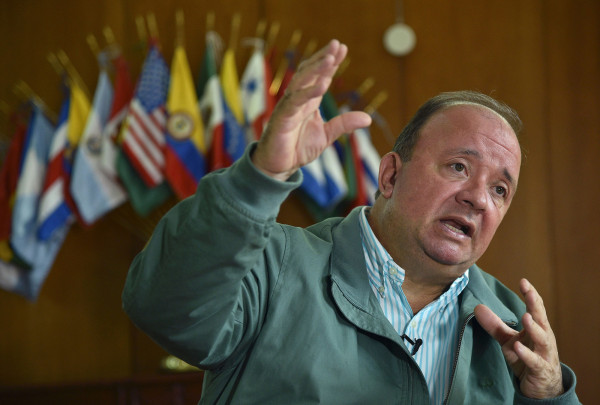PBS: Escaping Eritrea … [Read More...] about ካብ ውሽጢ ቤት ማእሰርታት ኤርትራ
Recruiting Mercenaries for Middle East Fuels Rancor in Colombia
Matthew Bristow, Nafeesa Syeed | 31
Colombia’s government is frustrated at having its top soldiers lured to the Middle East as mercenaries for Saudi Arabia and the United Arab Emirates when they are still needed to fight insurgents and drug traffickers, Defense Minister Luis Carlos Villegas said.

A Saudi-led coalition fighting in Yemen has deployed Colombian contractors, according to a former army officer who has been involved in recruiting contractors and a senior government official, who asked not to be named because he isn’t authorized to speak publicly about the matter. Soldiers are persuaded to quit the army when their terms of enlistment end by the prospect of earning about seven times as much in the Middle East, the former officer said.
Colombia’s efforts to negotiate with Middle East governments over the hiring of mercenaries have so far failed, Villegas said in a Dec. 22 interview in Bogota. While Colombia has reached a tentative peace accord with the country’s biggest rebel group, its special forces are targeting new mafia groups seeking to fill a void left by a planned demobilization.
Under a treaty, Colombia could send instructors to the Middle East on a temporary basis, he said. This would be preferable to the current situation, whereby “someone in the underground of Bogota tries to reach our armed forces to see how 20 of our special forces can go undercover to the Middle East,” he said.
No Saudi or U.A.E. government officials were available to comment about their use of Colombian soldiers and the potential for an agreement with the South American country’s government.
Colombian troops are among the most battle-hardened in the Americas, having fought in jungles and mountains for five decades against a guerrilla insurgency. In an operation in October, special forces tracked down and killed Victor Ramon Navarro, known as “Megateo,” a cocaine trafficker with a private army who dominated a mountainous region bordering Venezuela. Elite troops “are key for the moment we are living,” Villegas said.
Better Wages
An experienced former Colombian soldier can earn $90 per day in the Middle East, compared with about $375 per month back home in the regular army, while someone of officer rank who speaks English can earn $250, according to the former army officer. The ex-officer estimates that there are about 2,000 Colombians working as contractors in the U.A.E., and said he knew of about 200 being sent to Yemen for roles such as guarding bases. The troops haven’t yet been involved in combat, he said.
Asked whether Colombia could mitigate the problem by increasing its soldiers’ wages, Villegas said, “I can’t compete with Abu Dhabi.”
The Saudi-led coalition, which includes the U.A.E., is fighting Shiite Houthi rebels in Yemen who drove President Abdurabuh Mansur Hadi out of the country early this year.
Combat Roles
Villegas said he’s aware of former troops being hired to guard infrastructure. The government hasn’t yet received any information about Colombian citizens having died in fighting in Yemen, according to a senior official in the Foreign Affairs Ministry who asked not to be named because she is not authorized to speak publicly.
Colombia’s troops have few peers in the Western Hemisphere. In addition to their battlefield experience, the country’s troops have won seven of the last 10 “Fuerzas Comando,” an annual competition among special forces soldiers from the Americas, including the U.S.
Hiring foreigners or contractors to wage war or defend installations is an age-old military practice. Nepalese Gurkhas have long been a part of the British and Indian armies. The French Foreign Legion, founded in the early 19th century, includes foreign citizens and has been deployed everywhere from Algeria to Kosovo. The U.S. relied on contractors to provide security to bases and personnel following the 2003 invasion of Iraq.
That history carries little weight with Villegas. He said Colombia needs to maintain its army at full strength even after a peace deal, to prevent a surge in crime and disorder, and that its special forces are vital.
“They are the best special forces on the continent,” he said. What’s happening now with the Gulf states is “not illegal, but it’s unfriendly.”
